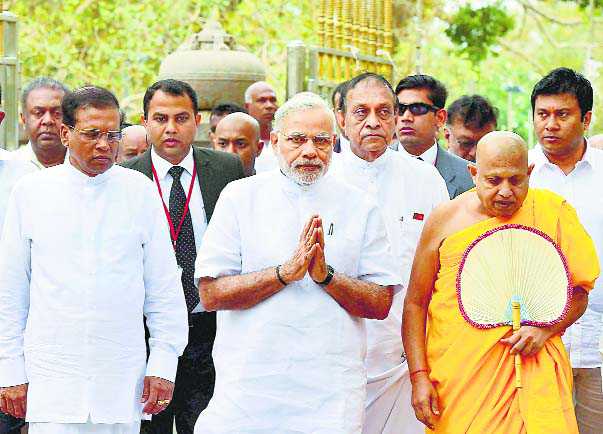Simran Sodhi
By its sheer size India dwarfs a number of smaller neighbouring nations. Two of them, Pakistan and Bangladesh, share a common history with India and ideally, this commonality should have resulted in stronger bonds.
However, with Pakistan, India has always shared a strained relationship and this year was no different. The government continued with its confused-about-Pakistan-policy. A positive outreach was followed by a negative one and a vicious cycle ensued. The year-end saw External Affairs Minister Sushma Swaraj travelling to Pakistan. A comprehensive composite dialogue would follow as the outcome. But mere announcements about the dialogue process are unlikely to change much on the ground if the decades-old trust deficit is not done away with. India has to distinguish between politics and diplomacy and photo-ops of the two prime ministers in a warm handshake must give way to concrete efforts to resolve both terrorism and Kashmir, among other bilateral issues.
With our other neighbour, Nepal, India did much worse. Initially, Prime Minister Narendra Modi's two visits generated much positivity and India's generous help in the aftermath of the earthquake further created more goodwill. But all that was squandered away when India forcefully insisted on constitutional changes in Nepal's constitution to secure political rights for the Madhesis. The border blockade, which Nepalese believe is of India's doing, has resulted in hardships for the common people and near-riot like conditions. This has queered the pitch.
In Bangladesh, India should thank Shaikh Hasina, who has proven to be a good friend to India. Her presence has ensured the policy towards India stays positive. A change of leadership at the top will, in all likelihood, disturb this equation and another unfriendly neighbour might prop up.
In Sri Lanka, the anti-India mood is still prevalent and despite India's threats and treats, Sri Lanka has refused to grant political autonomy to the Tamil minority. India's past history of meddling in its internal affairs has the Lankans wary and despite Rajapakse's exit, the relationship is hardly rosy.
Bhutan is perhaps the only success story India has as far as its neighbourhood policy is concerned. But then credit must also be given to the Bhutanese leadership who have stood by India despite an aggressive and keen China eagerly awaiting to get in. India would be well advised to let Bhutan be and not allow it go the Nepal way.
Interestingly, PM Modi made 'neighbourhood first' a hallmark of his foreign policy and he even chose Bhutan for his first visit abroad. But the problem with his foreign policy is that it is too invested in his own persona. There are times one tends to forget that India even has a foreign minister. Her attendance at the Heart of Asia conference in Pakistan recently was more an aberration rather than the norm.
The Prime Minister made a total of 25 visits abroad this year. Some countries he visited for a second time. While the glitzy NRI events got an extensive media coverage, not much happened by way of policy initiatives.
At present, India seems to be surrounded by unhappy neighbours. In the coming year, it would do India well to make a simple resolve: to cut down on photo ops and listen in to what smaller nations have to say.
YEAREND SPECIAL
Unlock Exclusive Insights with The Tribune Premium
Take your experience further with Premium access.
Thought-provoking Opinions, Expert Analysis, In-depth Insights and other Member Only Benefits
Already a Member? Sign In Now










